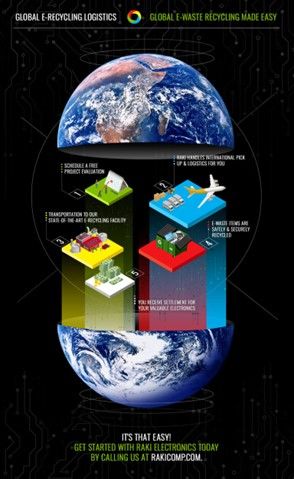Disposing End-Of-Life Electronics To Improve The Lives Of People: RAKI's Futuristic Mission Vision

The fast-paced culture of the modern world drives impressive progress and introduces new developments, solutions, and inventions. However, the technology revolution is a double-edged sword. A mountain of electronic waste created by the global culture of 'use and throw-away' is hiding behind the glory of devices of all use cases and sizes, dauntingly looming over the health of people, animals, and the planet. In 2024, as of April 10, nearly 14 million tons of electrical waste have been thrown out. Sadly, most of that waste isn't disposed of properly. Electronic recycling companies, such as RAKI, reveal themselves as an effective and sustainable solution to the global problem.
The first computers and mobiles ever introduced to man significantly differed from modern offerings. Over the years, laptops, computers, and phones have gotten smaller, slimmer, and more convenient. Ironically, despite devices being more lightweight and requiring fewer cords and cables, humanity is producing more e-waste than ever. The current work landscape can easily explain that paradox; according to a recent report, 92% of jobs these days require digital skills from potential employees. Fuelling the widespread adoption of technology further, more and more people work remotely and need swift and efficient technology to perform work tasks. While the momentous shift toward a tech-oriented future solved many problems related to transportation costs and maintaining a work-life balance, it calls for frequent tech upgrades and new devices.

To keep up with the ever-growing tech demand, approximately 300 million computers, and 1 billion cell phones are produced annually. That number is predicted to grow by 8% per annum. In addition to being extremely cost-prohibitive, high production creates enormous heaps of waste. Every year, nearly 40 million tons of electronic waste are generated, the equivalent of throwing away 800 laptops every second. As a result, e-waste accounts for 70% of the planet's toxic waste.
According to WHO, in 2019, only 17.4% of all e-waste (53.6 million tonnes) was documented as formally collected and recycled. Nearly 83% of unaccounted-for e-waste most likely ended up in landfills, where it was burned. Burning tech devices seems like a quick and cheap way to dispose of unwanted mobiles or laptops. However, most people don't realize the detrimental implications of that process. Electronics contain a myriad of toxic materials, from lead, arsenic, cadmium, selenium, chromium, and dioxins to mercury. When treated inappropriately, these substances become harmful and pose a grave risk to the lives of humans and animals.
In the same report, WHO emphasizes that pregnant women and children are the most vulnerable to the harmful impact of e-waste toxins. Some of the health implications that stem from direct or indirect contact with substances that are released into the air include adverse neonatal outcomes, learning and behavior issues, reduced lung and respiratory function, increased asthma incidence, and disruption in the development of the central nervous system during pregnancy, infancy, childhood, and adolescence.
Inhumane practices and child labor thrive in the e-waste processing sector, with more than 18 million children between 5 and 17 forced to scavenge and burn discarded electronics. That problem is evident, especially in Asia, where more than 80% of e-waste from the US and many other countries ends up.
In 2024, the necessity of proper and safe disposal of obsolete devices should be considered common knowledge. However, statistics paint a drastically different picture, highlighting the need for more education, awareness, and e-waste recycling services. RAKI Electronics Recycling aims to bridge the gap between tech waste and safety, providing an array of services that comply with R2 (Responsible recycling), ISO-14001, ISO-9001, and E.P.A. guidelines.
Experts at RAKI possess nearly 50 years of collective industry experience, and their all-encompassing expertise is evident. The company has a 'no landfills' policy, offers secure data destruction, and shines with the highest e-waste disposal certificates in the industry. Additionally, RAKI conducts yearly external audits that protect its clients and improve sustainability progress. Unlike common scavenging, burning, and shredding practices, RAKI, a pioneer in e-waste recycling, performs full de-manufacturing and tear down, ensuring no toxic substances infiltrate the Earth.
"The current e-waste landscape presents a dual threat: environmental pollution and human exploitation". Amit Behor, VP of Operations at RAKI, highlights this concerning reality. Recognizing this issue three decades ago, RAKI foresaw the necessity for responsible disposal of electronics. While the problem wasn't as severe then, evolving regulations have thrust e-waste into corporate agendas. RAKI's focus lies in advancing recycling technologies to drive genuine progress."
© Copyright IBTimes 2024. All rights reserved.











